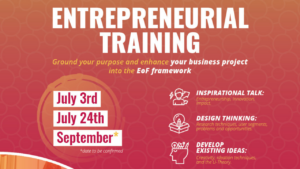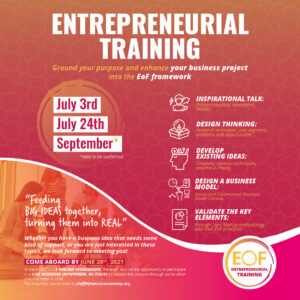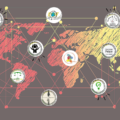
Workshop
Entrepreneurship to change the future

We talk all the time about changing the course of the existing system. About changing the economy and forms of consumption. But how often do we talk about the importance of having new entrepreneurs? Or better yet, have you ever dared to dream of being an entrepreneur who brings new forms of economy to life?
“The fundamental characteristics of entrepreneurs are anticipation, scientific rigor, and the search for the truth”, affirms Francesca Giglio, a staff member of “The Economy of Francesco” movement. Giving the impression that the entrepreneur is the equivalent of a superhero. And she continues: “The entrepreneur is driven by innovation (new and useful) with the goal of solving real and relevant problems for people, not just for profit”.
So it’s true: being an entrepreneur is like being a superhero. It’s about giving oxygen to a system that is not capable of breathing fresh air on its own. But we’re not talking about just any entrepreneur. This is where “The Economy of Francesco” movement, which brings together young economists, entrepreneurs and change-makers from around the world, becomes relevant. They have been called by Pope Francis to give a new soul to the global economy and for this they are committed to it at various levels, one of the most concrete being the creation of businesses.
We interviewed Gabriele Sarnari, a young Italian who is part of “The Economy of Francesco”, and who is driven by a strong entrepreneurial spirit. He is 30 years old and currently works in the commercial area of an Italian sports company. For him, the enterprise is the fulfilment of a vocation. “Being an entrepreneur today means having a calling and answering to a calling. However, in every calling there is also a risk, as there is in starting a company. And here, the motivation that drives every entrepreneur to launch a business idea comes into play. Raising profits is not enough to mitigate risk. It takes willpower and commitment to pursue a bigger goal, a goal that can contribute to the good of the entire community and that will always be the benchmark to know if we’re making the right decisions”.
Entrepreneurship, as a vocation, is also recalled by Pope Francis in his encyclical Laudato Si’, “Business is a noble vocation, directed to producing wealth and improving our world. It can be a fruitful source of prosperity for the areas in which it operates, especially if it sees the creation of jobs as an essential part of its service to the common good”.
But vocation is not the only necessary ingredient. It also requires preparation and training. As Francesca Giglio points out, “There are young people with great ideas and genuine motivation, capable of providing solutions to some of the biggest challenges of our time (in the social and environmental spheres) but at the same time it is necessary to reduce the risk of failure of an innovation project”. Gabriele agrees, emphasizing that “doing business and doing it well requires scrupulous preparation”.
Faced with this demand that the world today has for entrepreneurs with vocation and training, “The Economy of Francesco” proposes a training program open to all young people who have an idea for innovation or who are attracted by these themes: The Entrepreneurial Training 2021.

These workshops aim to help projects take off and provide aspiring entrepreneurs with the tools they need to develop ideas, starting first with the “why”, the main “purpose”, the “meaning” and “value” of the business idea. “The goal is not to fill you up with all-encompassing knowledge of the rules of the market or business management, but rather to enhance motivation,” explains Francesca Giglio.
Three workshops in July and September, because this is a time when everything can change and we have the power and responsibility to do our part, taking action and deepening business transformation.
Are you interested?
You can sign up clicking here!
The entrepreneur innovates by vocation, because entrepreneurs are like artists: inhabited by a demon that makes them restless. If they were driven by profit, they would not be entrepreneurs, but speculators”.
Luigino Bruni, Entrepreneur and Community, lesson of Civil Economy.







